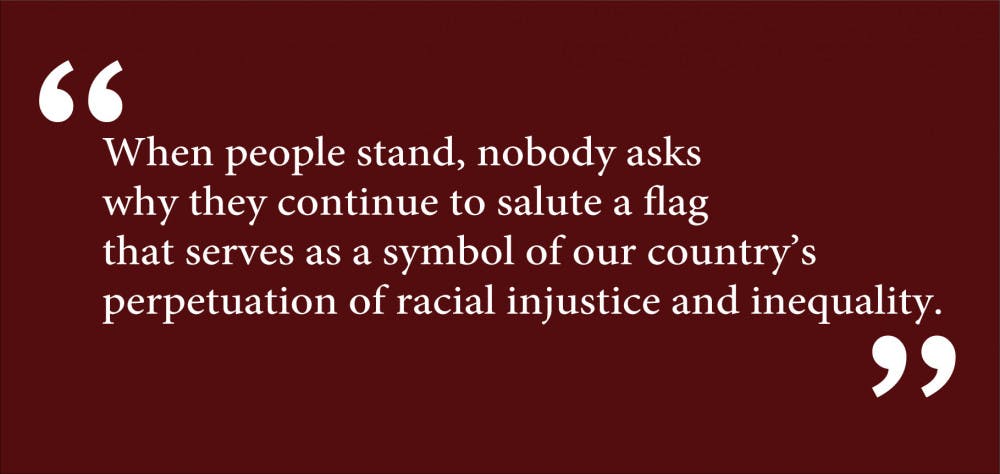Perhaps in response to my last op-ed, in which I defended the NFL players who have chosen to kneel for the national anthem to protest police brutality, a lot of people have been asking me whether I plan to kneel for the anthem during the upcoming college baseball season as a member of the team. Despite my reluctance to provide a concrete answer without the benefit of further reflection, those conversations typically end with the questioner offering two similar refrains: if I’m going to kneel, they say, I should both volunteer more of my time actually helping the black community and help out with veterans’ causes to ensure that people know I’m not disrespecting military members. While it’s certainly legitimate to ask people like me to contribute more to the community, it is hypocritical — and, even more importantly, disempowering to protestors — to expect people who choose to kneel to do more than those who stand simply because kneeling is erroneously seen as more politically charged than standing.
It’s fair to ask these questions of me: I’m a white, middle-class kid from the Connecticut shoreline. By my estimation, I owe everything I have — my soon-to-be-acquired Ivy League degree, my experience playing college baseball, my sparkling family life — to the circumstances of my birth. Given how I’ve benefitted from conditions out of my control, then, it seems like I should have a greater responsibility to help our society’s most vulnerable populations. As it is, I volunteer, I engage with my community and I actively participate in the democratic process to support fairer policies. Is this enough? I’m not sure. Maybe instead of only volunteering twice a year, I should donate a little of my time every weekend. Maybe instead of buying cases of beer for myself and my roommates, I should give that money to the Wounded Warrior Project. Whatever the case may be, it is reasonable to expect someone with my level of privilege to contribute more in terms of community service and engagement.
Yet any expectation that I should contribute more is based solely on my privilege, not on whether I choose to kneel. Those who choose to stand suffer from the delusion that standing for the anthem is apolitical and uncontroversial, merely a symbol of one’s loyalty to the United States. That assessment couldn’t be further from the truth.
When confronted with the prospect of me kneeling for the anthem, people have felt compelled to ask what I really do to help black Americans — as if such a refusal to be complicit in a society that is indifferent to the murder of black Americans isn’t helping. They also ask what I do to honor veterans, since in their minds, my support for those who kneel shows my lack of respect for those who have served in the military.
And yet when people stand, nobody asks why they continue to salute a flag that serves as a symbol of our country’s perpetuation of racial injustice and inequality. Nobody suggests those who stand should spend their time bettering the lives of America’s oppressed populations to avoid the perception they support the status quo. Nobody offers the advice that instead of merely standing, they should really help our nation’s 40,000 homeless veterans — of which 45 percent are African American or Hispanic. Nobody wonders why standing to honor our military is considered patriotic and decent at a time when the Trump administration is ramping up the Obama-era drone strikes that have brutally slaughtered thousands of civilians in Syria and Iraq.
The different levels of scrutiny applied to kneelers versus standers are symptomatic of a culture that exhibits both blind deference to our military and general apathy regarding racial inequality. No matter how horrific the atrocities the United States government commits or how imperialistic its policies are, the anti-kneelers will always see the military as pure and good. And no matter how many black Americans are jailed and unjustifiably killed, they will always see the anthem protestors as ungrateful “sons of bitches,” to quote our president.
Challenging kneelers to prove the merit of their political expression through community work is the logical progression of those forces — a form of social control that seeks to erect barriers meant to dissuade citizens from engaging in unpopular speech. Demanding that kneelers have to contribute more to their communities implies that standing is a pure display of patriotism that need not be made with other acts to prove itself. That is wrong. Context matters, and given the current state of affairs, standing is to be complicit in the persistence of police brutality. Standing is to be complicit in enabling a government that, just last week, allowed Immigration and Customs Enforcement to detain a 10-year-old immigrant suffering from cerebral palsy on her way to receiving surgery. Standing is to be complicit in the existence of our country’s appallingly high degree of racial segregation in our communities and schools.
Why must kneelers pay with their time for protesting that? Why can’t someone kneel just because it’s the right thing to do?
Sam Grigo ’18 is a sports columnist and can be reached at samuel_grigo@brown.edu. Please send responses to this opinion to letters@browndailyherald.com and other op-eds to opinions@browndailyherald.com.





